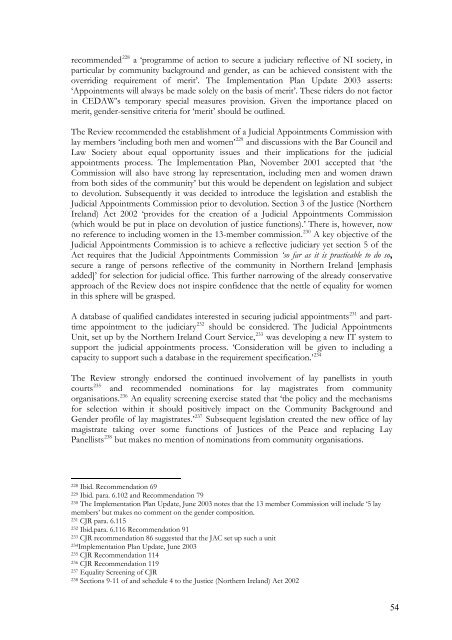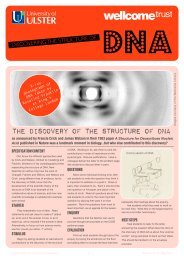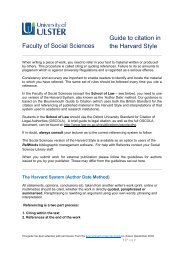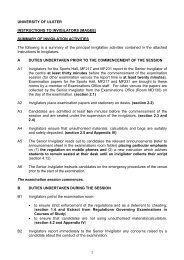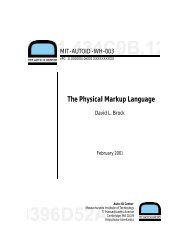Agreement Reached in the Multi-Party Negotiations - Transitional ...
Agreement Reached in the Multi-Party Negotiations - Transitional ...
Agreement Reached in the Multi-Party Negotiations - Transitional ...
Create successful ePaper yourself
Turn your PDF publications into a flip-book with our unique Google optimized e-Paper software.
ecommended 228 a ‘programme of action to secure a judiciary reflective of NI society, <strong>in</strong><br />
particular by community background and gender, as can be achieved consistent with <strong>the</strong><br />
overrid<strong>in</strong>g requirement of merit’. The Implementation Plan Update 2003 asserts:<br />
‘Appo<strong>in</strong>tments will always be made solely on <strong>the</strong> basis of merit’. These riders do not factor<br />
<strong>in</strong> CEDAW’s temporary special measures provision. Given <strong>the</strong> importance placed on<br />
merit, gender-sensitive criteria for ‘merit’ should be outl<strong>in</strong>ed.<br />
The Review recommended <strong>the</strong> establishment of a Judicial Appo<strong>in</strong>tments Commission with<br />
lay members ‘<strong>in</strong>clud<strong>in</strong>g both men and women’ 229 and discussions with <strong>the</strong> Bar Council and<br />
Law Society about equal opportunity issues and <strong>the</strong>ir implications for <strong>the</strong> judicial<br />
appo<strong>in</strong>tments process. The Implementation Plan, November 2001 accepted that ‘<strong>the</strong><br />
Commission will also have strong lay representation, <strong>in</strong>clud<strong>in</strong>g men and women drawn<br />
from both sides of <strong>the</strong> community’ but this would be dependent on legislation and subject<br />
to devolution. Subsequently it was decided to <strong>in</strong>troduce <strong>the</strong> legislation and establish <strong>the</strong><br />
Judicial Appo<strong>in</strong>tments Commission prior to devolution. Section 3 of <strong>the</strong> Justice (Nor<strong>the</strong>rn<br />
Ireland) Act 2002 ‘provides for <strong>the</strong> creation of a Judicial Appo<strong>in</strong>tments Commission<br />
(which would be put <strong>in</strong> place on devolution of justice functions).’ There is, however, now<br />
no reference to <strong>in</strong>clud<strong>in</strong>g women <strong>in</strong> <strong>the</strong> 13-member commission. 230 A key objective of <strong>the</strong><br />
Judicial Appo<strong>in</strong>tments Commission is to achieve a reflective judiciary yet section 5 of <strong>the</strong><br />
Act requires that <strong>the</strong> Judicial Appo<strong>in</strong>tments Commission ‘so far as it is practicable to do so,<br />
secure a range of persons reflective of <strong>the</strong> community <strong>in</strong> Nor<strong>the</strong>rn Ireland [emphasis<br />
added]’ for selection for judicial office. This fur<strong>the</strong>r narrow<strong>in</strong>g of <strong>the</strong> already conservative<br />
approach of <strong>the</strong> Review does not <strong>in</strong>spire confidence that <strong>the</strong> nettle of equality for women<br />
<strong>in</strong> this sphere will be grasped.<br />
A database of qualified candidates <strong>in</strong>terested <strong>in</strong> secur<strong>in</strong>g judicial appo<strong>in</strong>tments 231 and parttime<br />
appo<strong>in</strong>tment to <strong>the</strong> judiciary 232 should be considered. The Judicial Appo<strong>in</strong>tments<br />
Unit, set up by <strong>the</strong> Nor<strong>the</strong>rn Ireland Court Service, 233 was develop<strong>in</strong>g a new IT system to<br />
support <strong>the</strong> judicial appo<strong>in</strong>tments process. ‘Consideration will be given to <strong>in</strong>clud<strong>in</strong>g a<br />
capacity to support such a database <strong>in</strong> <strong>the</strong> requirement specification.’ 234<br />
The Review strongly endorsed <strong>the</strong> cont<strong>in</strong>ued <strong>in</strong>volvement of lay panellists <strong>in</strong> youth<br />
courts 235 and recommended nom<strong>in</strong>ations for lay magistrates from community<br />
organisations. 236 An equality screen<strong>in</strong>g exercise stated that ‘<strong>the</strong> policy and <strong>the</strong> mechanisms<br />
for selection with<strong>in</strong> it should positively impact on <strong>the</strong> Community Background and<br />
Gender profile of lay magistrates.’ 237 Subsequent legislation created <strong>the</strong> new office of lay<br />
magistrate tak<strong>in</strong>g over some functions of Justices of <strong>the</strong> Peace and replac<strong>in</strong>g Lay<br />
Panellists 238 but makes no mention of nom<strong>in</strong>ations from community organisations.<br />
228 Ibid. Recommendation 69<br />
229 Ibid. para. 6.102 and Recommendation 79<br />
230 The Implementation Plan Update, June 2003 notes that <strong>the</strong> 13 member Commission will <strong>in</strong>clude ‘5 lay<br />
members’ but makes no comment on <strong>the</strong> gender composition.<br />
231 CJR para. 6.115<br />
232 Ibid.para. 6.116 Recommendation 91<br />
233 CJR recommendation 86 suggested that <strong>the</strong> JAC set up such a unit<br />
234 Implementation Plan Update, June 2003<br />
235 CJR Recommendation 114<br />
236 CJR Recommendation 119<br />
237 Equality Screen<strong>in</strong>g of CJR<br />
238 Sections 9-11 of and schedule 4 to <strong>the</strong> Justice (Nor<strong>the</strong>rn Ireland) Act 2002<br />
54


